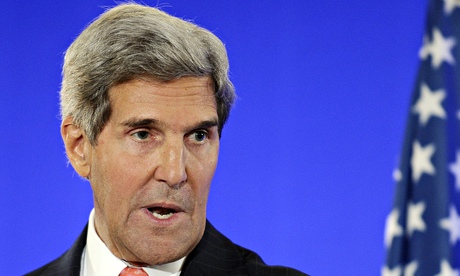John Kerry's plans to resolve Israel-Palestine conflict will not run smoothly

Even sceptics award the US secretary of state John Kerry high marks for effort and for keeping his powder dry. Photograph: Susan Walsh/AFP/Getty Images
Unlike other US secretaries of state who have tried their hand at solving the Israel-Palestine conflict,John Kerry has managed to keep people guessing about his plans. It was inevitable as the deadline approached for reaching a "framework agreement" that details would start to leak. Washington is unlikely to confirm their accuracy. But they do not boost the already low expectations that a workable deal can be done.
Reported proposals for a Palestinian capital in the east Jerusalem suburb of Beit Hanina, Israel's retention of 10 West Bank settlement blocs, permanent control of the Jordan valley and the demand to recognise Israel as a Jewish homeland do not add up to a package that would likely be acceptable to even the most pliable Palestinian leader: thus the claim that President Mahmoud Abbas "exploded" when told of it by Kerry in Paris last weekend.
Israel's prime minister, Binyamin Netanyahu, facing pressure from Barack Obama when they meet on 3 March, might find such a US framework attractive – though he will face fierce opposition from extremists in his own coalition. Naftali Bennett of the Jewish Home party is against any kind of Palestinian state. "If the Kerry document is a compromise between the Israeli right and the extreme right it will be a disaster," warned one PLO negotiator in Ramallah. "What we need is a compromise between Israel and Palestine based on international legality."
No one is holding their breath in advance of Kerry's 29 April target date. And Abbas and Netanyahu already seem to be preparing to blame each other for the failure of the talks.
Even sceptics award the secretary of state high marks for effort and for keeping his powder dry. But his position that both sides will able to "express reservations" (a handy device, some argue, for assuaging domestic opposition) threatens to undermine his own work. US ideas on borders, settlements, Jerusalem and refugees cover the wearily familiar "core" issues of the conflict. The "Jewish state" issue, Palestinians (and some Israelis) say, is a new demand that is designed to cause trouble. (The PLO and Israel recognised each other in the 1993 Oslo agreement). Gaza, controlled by the Islamists of Hamas, is not even being discussed.
Palestinians are already looking ahead. Talk is rife of a "diplomatic intifada" involving accession by the state of Palestine (recognised by the UN general assembly) to bodies such as the international criminal court – a platform for legal moves against the occupation. Holding off from such action was an Israeli precondition for resuming talks. "The emails have been written," said one diplomat."They just need to press the send button."
Renewed violence cannot be ruled out if the negotiations do collapse. But the catastrophic outcome of the second intifada in 2000 suggests a preference for peaceful direct action like the recent occupation at Ein Hijleh in the Jordan Valley – the work of young independent activists inspired by the spirit of the Arab spring who hate factionalism and Abbas's Palestine Authority. Many place their hopes in the boycott, disinvestment and sanctions movement, which is attracting attention internationally and causing alarm in Israel.
Failure by Kerry, it is widely agreed, would make it all but impossible to keep alive the slim hope that a two-state solution to the conflict can be achieved 46 years after Israel's victory in the 1967 war.
"The reality on the ground is that the two-state solution is just not there any more," warned Mahdi Abdel-Hadi, who runs a Palestinian thinktank in east Jerusalem. Others on both sides say that the cost of achieving it becomes greater all the time.
Outside Gaza, the conflict is relatively dormant. Suicide bombings inside Israel have ended. But a new Amnesty report on Thursday highlighted the use of excessive violence by Israeli troops acting with impunity against Palestinians. The daily grind of checkpoints, settler provocations and permits forms the background to Israeli complaints of "incitement".
Analysts and diplomats argue that for any peace agreement to work Netanyhau has to be able to show his supporters that Israel has become more secure while Abbas needs to demonstrate that he has advanced the cause of Palestinian independence. Kerry may yet surprise. But it would not be surprising if he was forced eventually to conclude that these goals are mutually exclusive.